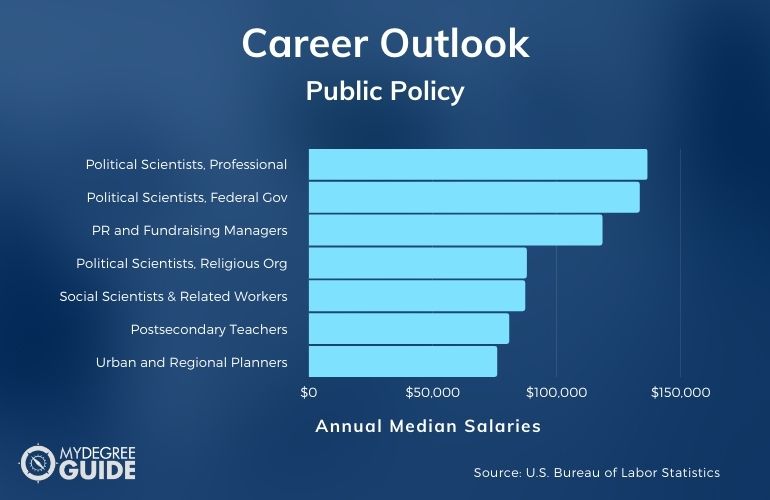If you are looking into public policy graduate programs, you might be wondering, what can you do with a masters in public policy?

An MPP degree can help prepare you to work in government relations or public administration.
Editorial Listing ShortCode:
You may learn how to analyze government policies and how to look for ways they can be improved.
What Can You Do with Masters in Public Policy?

There are many different types of careers that involve public policy analysis. Professionals with a Master of Public Policy can work for someone in a political office, performing legislative analysis or working on campaign operations or public relations.
In the private sector, public policy graduates can work for a business or corporation, handling government relations. They can analyze the ways public policy affects the company and advocate for policies that are beneficial to the company.
Some nonprofit organizations also hire employees to analyze government policies. Organizations that advocate for reform of public education, healthcare, or a myriad of other issues typically need people to help decide exactly which policies to support.
Some graduates want to start their own private organization that deals with policy analysis related to an issue they care about. A public policy master program can help equip these entrepreneurs with many needed skills for their endeavors.
5 Things You Can Do with a Master’s in Public Policy

There are a number of different career paths that involve analysis of public policy. Here are some specific industries in which you can apply the knowledge you’ll learn from a master’s degree in public policy.
1. Professional, Scientific, and Technical Services
In the professional, scientific, and technical services sector, policy analysts and political scientists typically work for private consulting firms.
They generally conduct survey research to determine public opinion of various government policies, compile the data from their research, and present their findings to others.
2. Federal Government

Political scientists who are employed by the federal government can function as advisors or consultants to elected officials, or they may assist with administrative work.
Federal government political scientists tend to follow current events and help determine the best course of action for solving problems that affect the public.
3. Religious, Grantmaking, Civic, Professional, and Similar Organizations
Some political scientists are employed by private organizations that lobby on behalf of various groups of people.
A political scientist or policy analyst who is employed by such an organization may analyze and predict how public policy changes could affect a specific group of people, such as members of a religion or workers in a certain occupation.
4. Educational Services

Some people who have studied public policy or political science go into the field education, instructing others on how to analyze public policy. This could mean teaching others at the secondary or postsecondary level.
Becoming a teacher at any level requires additional training or certification. Requirements to become a high school teacher vary by state, and teaching at a college or university typically requires a doctoral degree. Some junior colleges, though, hire teachers who only hold a masters degree.
5. Museums, Research Institutes, and Historical Societies
Public policy historians research and analyze the history of public policy to understand how and why public policy has changed over time. They can also educate the general public about such topics.
Public policy historians tend to work in places such as museums, research institutes, and historical societies.
Public Policy Careers

According to the Bureau of Labor Statistics, the following careers are related to public policy.
| Careers | Annual Median Salaries |
| Political Scientists, Professional, Scientific, and Technical Services | $136,640 |
| Political Scientists, Federal Government | $133,460 |
| Public Relations and Fundraising Managers | $118,430 |
| Political Scientists, Religious, Grantmaking, Civic, Professional, and Similar Organizations | $87,910 |
| Social Scientists and Related Workers | $87,260 |
| Postsecondary Teachers | $80,790 |
| Urban and Regional Planners | $75,950 |
| Political Scientists, Educational Services | $75,260 |
| Historians | $63,100 |
| Survey Researchers | $59,870 |
Knowledge of public policy can have applications in many different industries.
Is Financial Aid Available?

Yes, there are many different types of financial aid available for qualifying graduate students in public policy.
You may be able to qualify and apply for federal aid, state aid, employer programs, or scholarships. If you want to apply for financial aid, you can start by filling out the Free Application for Federal Student Aid (FAFSA) to see if you qualify.
What Is Public Policy?

Public policy is the study of how government regulations actually affect people. Public policy analysts conduct research about how effective current regulations are and whether they have unintended consequences. They also look for ways to improve public policy.
People in this field are continually looking for ways to improve policies for the benefit of their communities. The goal of public policy analysts is to solve real-world problems that affect a particular community or all of society.
What Is an MPP?
An MPP is a Master of Public Policy degree online or on-campus program. An MPP program is meant to prepare you for a variety of careers that involve analyzing government regulations and how they affect the general public.
As part of a Master of Public Policy degree program, you may learn to conduct research on the effectiveness of government regulations and to correctly interpret statistics. You may also hone your communication skills and your ability to present your findings to other people.
What Is a Masters in Public Policy Good For?

A masters degree in public policy allows you to pursue a variety of careers that involve knowledge of public policy and its effects.
Public policy graduates tend to work in a government office or consult for private organizations that lobby for reforms to policies. They can pursue a job in government relations for a business or corporation as well.
Knowledge learned in a public policy graduate program can also be useful to those who want to start their own advocacy organization.
What Are Some of the Courses I Will Take in a Public Policy Masters Program?

Public policy is usually a multi-disciplinary study. Learning about public policy involves legal knowledge, research methods and statistics, and good communication skills in speaking and writing.
Your curriculum for your masters program in public policy will include courses on various topics related to the field, such as data analysis, leadership, economics, ethics, program evaluation, urban planning, and public finance.
How Much Money Can You Make with Masters in Public Policy?

According to the Bureau of Labor Statistics, the median annual salary for political scientists in general is $125,350. Most political scientists earn between $62,840 and $170,800. Political scientists who are employed in the professional, scientific, and technical services sector earn a median annual salary of $136,640.
Political scientists who are employed by the federal government earn an average of $133,460, and those who work for religious, civic, grantmaking, professional, and similar organizations earn an average of $87,910.
Political scientists employed in educational services earn a median annual salary of $75,260. Teaching at a college or university usually requires earning a doctoral degree, but some junior colleges will hire professionals in the field who only hold a masters.
What’s the Difference Between Public Policy vs. Public Administration?
A masters in public policy and a masters in public administration are similar degree programs that usually feature some overlap in the required coursework. At universities that offer both types of degrees, there is often no fixed definition of exactly what differentiates the two.
Usually, though, degree programs in public administration focus primarily on the internal operations of government programs and how to implement them. Degree programs in public policy tend to focus more on how government regulations affect society as a whole and how to change and improve policies.
Is a Masters in Public Policy Worth It?

Yes, a master’s degree in public policy is worth it for many students. Jobs in the life, physical, and social science field are projected to grow at a rate of 5% in the next 10 years (Bureau of Labor Statistics).
Common public policy careers in this field include political scientist, public policy historian, social scientist, public relations and fundraising manager, and survey researcher. A master’s degree in public policy can help improve your understanding of how people are affected by government regulations in their daily lives.
The study of public policy is rewarding for many people because it enables them to help their communities.
Getting Your MPP Online

There are many paths you can pursue with a master’s degree in public policy. If you are interested in the study of public policy and seek to improve how government regulations work, you might consider taking this next step in your education and career.
There are many options when it comes to choosing a public policy masters program, including online programs. Many accredited online masters in public policy programs offer flexible schedules that allow you to earn your graduate degree at your own pace and convenience. For example, there are part time master of public policy programs that may help you earn your degree alongside your work and family responsibilities.
If you are wanting to advance your career or continue your education, you can start today by exploring accredited universities.
